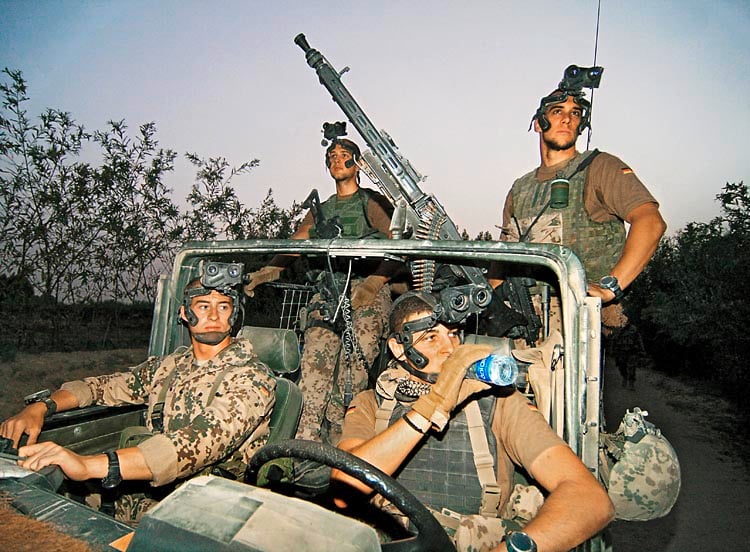 Here in the US, we do not have many discussions about whether our nation is at war in Afghanistan. It is basically seen as a fact. After all, we were attacked on our homeland by terrorists from the nation who were backed by its Taliban government at the time. Only recently, have their been discussions as to whether we could succeed in this conflict, and even those are rather muted. According to this excellent and provocative Der Speigel article, it is shown that in Germany, questions about the their nation's role and presence in NATO's ISAF mission in Afghanistan are the rule and opposition to the mission the majority opinion.
Here in the US, we do not have many discussions about whether our nation is at war in Afghanistan. It is basically seen as a fact. After all, we were attacked on our homeland by terrorists from the nation who were backed by its Taliban government at the time. Only recently, have their been discussions as to whether we could succeed in this conflict, and even those are rather muted. According to this excellent and provocative Der Speigel article, it is shown that in Germany, questions about the their nation's role and presence in NATO's ISAF mission in Afghanistan are the rule and opposition to the mission the majority opinion.
With Afghanistan becoming increasingly more unstable and the Taliban gaining stronger and more numerous footholds in which to launch attacks against the Afghan government and NATO forces, this is a time when a strong will is needed. Not only a strong will, but a belief that what your mission is is right and that you can accomplish it. The Germans, who have been placed in the relatively calm Kunduz Province and have avoided major combat missions, have seen the Taliban and the conflict come to them in recent months. They lost a soldier to a roadside bomb and a German checkpoint mistakenly killed three civilians. Still there are signs that German citizens oppose their presence in Afghanistan and even their military leaders in the nation have failed to call the conflict a war. This is a telling comment by the German defense minister and the American leader of NATO troops at a recent press conference:
“Are we at war here?” a reporter asked the defense minister in Kabul the next day, to which an exasperated Jung replied: “We are fighting terrorism, but we are not at war.” Only seconds later, his host corrected him in front of live cameras. War? “Yes, we are waging a war,” said David McKiernan, the American four-star general commanding the International Security Assistance Force in Afghanistan (ISAF).”
The country and its soldiers have in many ways used a myriad of terms instead of calling the conflict war; they have used “networked security,” a “civilian-military approach,” “stabilization” and “reconstruction assistance.” According to Speigel, 2/3 of German citizens are opposed to the Bundeswehr's Afghan mission, and ‘politicians in Berlin read opinion polls more often than reports on the military situation.’ An even more disturbing statement in the article read, “An astonishing commonality unites opponents and supporters {of the Afghan war}. Both are dangerously uninterested in the conflict.” The problem with this is that if one reads the second half of the Speigel article, one cannot help but see that the Taliban, led by Mullah Salam in Kunduz, are in fact bringing a war to NATO and its German contingency, whether they like it or not. Attacks, especially of the suicide bomber variety, have increased dramatically along with complex missions against what were thought as safe NATO bases near Kabul and in the north.
The US and several NATO allies have recently been escalating its military reach, performing military mission in Pakistan's FATA for instance, and are clearly trying to push back the Talibans recent gains. Will this work? Is this a long-term strategy? The US knows that the military is not the only solution to this conflict, but that it has a major and necessary role to defeat this insurgency. I just don't see how the Germans, a proud and strong nation and people, could still be sitting on the fence, or even behind, when in front of them is battle worth fighting and an enemy worth defeating. I’m not trying to say that the Germans and other NATO nations not involved in direct combat in the past few years have not contributed much to stablizing and creating a democratic Afghanistan, they have, but more needs to be done.
(Photo: Der Speigel: A Bundeswehr patrol in Kunduz. At the end of August, a German soldier died and, not long later, soldiers at a German roadblock opened fire on a car, killing three civilians.)